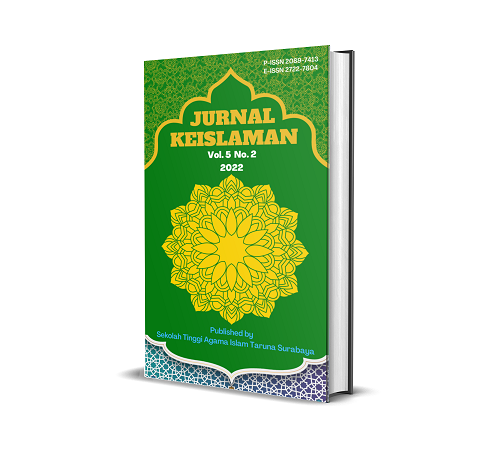TELAAH KAPASITAS PEREMPUAN SEBAGAI PEMIMPIN DI ERA MODERN PERSPEKTIF HADIS
Abstract
This study aims to find out and further analyze how the capacity of women to become leaders in the modern era using the perspective of hadith. In addition, it also aims to determine the capacity of women to become leaders in the modern era by using hadith as a research reference. Women's leadership is still a matter of unresolved debate. Al-Quran verses and hadiths that help the scholars in terms of leadership are still a complicated idea. Cleric's interpretation often says that even the capacity for opportunity to become a leader has a narrow range of motion. The method used in this research is qualitative with a systematic literature review model. The results of this study indicate that women have the capacity to lead, even though they are not in leadership and must have the ability to lead. In addition, it shows that the hadith used as the basis for prohibiting women from leading does not actually say that women are prohibited from becoming leaders only by the presence of a leader and these things are based on different social circumstances.References
Al Ahsani, N. (2020). Kepemimpinan Perempuan Pada Masyarakat dalam Perspektif SaÊ¿Ä«d Ramaá¸Än Al-BÅ«á¹Ä« (Telaah Hadis Misoginis). Jurnal Al-Hikmah, 18(1), 57–74. https://doi.org/10.35719/alhikmah.v18i1.23
Alvado, E., Meisa, D., & Anzari, P. P. (2021). Perspektif feminisme dalam kepemimpinan perempuan di Indonesia. 1(6), 711–719. https://doi.org/10.17977/um063v1i62021p711-719
Arsal, A., Busyro, B., & Imran, M. (2020). Kepemimpinan Perempuan: Penerapan Metode Tafsir Hermeneutika Feminisme Amina Wadud. AL QUDS : Jurnal Studi Alquran Dan Hadis, 4(2), 481. https://doi.org/10.29240/alquds.v4i2.1976
Bedong, M. A. R., & Ahmad, F. (2018). Kepemimpinan Wanita Di Dunia Publik (Kajian Tematik Hadis). Al-Maiyyah: Media Transformasi Gender Dalam Paradigma Sosial Keagamaan, 11(2), 214–231. https://doi.org/10.35905/almaiyyah.v11i2.656
Epriadi, D., & Arman, Z. (2020). Analisis Terhadap Kepemimpinan Perempuan Ditinjau Dalam Perspektif Hukum Islam Dan Hukum Indonesia. Al-Muaddib: Jurnal Ilmu-Ilmu Sosial Dan …, 5(2), 217–223.
Fatmawati, E., & Fatmawati, E. (2019). Perempuan , Abdurahman Wahid dan Kepemimpinan Perempuan dalam Manajemen Pendidikan Agama Islam. 2(1), 1–2.
Himmah, D. N. A., & Yaqien, N. (2017). Kepemimpinan Perempuan Dalam Perspektif Islam. J-MPI (Jurnal Manajemen Pendidikan Islam), 2(2), 142. https://doi.org/10.18860/jmpi.v2i2.5483
Khairil, A. (2004). Kepemimpinan Perempuan, Tekstual, Kontekstual, Fikih Siyasi. Himmah, v, 1–15.
Nur, F., & Wahyudi. (2018). Tinjuan Hermeneutis Terhadap Hadis Kepemimpinan Perempuan Dalam ISlam. Fikri, 3.
Shidiq, U., & Choiri, M. (2019). Metode Penelitian Kualitatif di Bidang Pendidikan. In Journal of Chemical Information and Modeling (Vol. 53). Retrieved from http://repository.iainponorogo.ac.id/484/1/Metode Penelitian Kualitatif Di Bidang Pendidikan.pdf
Sofyan, & Zulkarnain, S. (2013). Fiqih Feminis.
Suryani, Lim, F., & Eva, D. (2017). Bunga Rampai ISLAM dan GENDER.
Tutik, S. (2010). Mengenal Sistematic Review Theory dan Study Kasus. 13, 124–132.
Yusuf, Q. (2002). Fatwa-fatwa kontenporer jilid 2 (2nd ed.). Jakarta.
Copyright (c) 2022 Mufid Abdul, Aziz Tegar Wahana, Muth Mainnah, Deny Marita Wijayanti

This work is licensed under a Creative Commons Attribution-ShareAlike 4.0 International License.
Authors who publish with this journal agree to the following terms:
- Authors retain copyright and grant the journal right of first publication with the work simultaneously licensed under a Creative Commons Attribution-ShareAlike that allows others to share the work with an acknowledgement of the work's authorship and initial publication in this journal.
- Authors are able to enter into separate, additional contractual arrangements for the non-exclusive distribution of the journal's published version of the work (e.g., post it to an institutional repository or publish it in a book), with an acknowledgement of its initial publication in this journal.
- Authors are permitted and encouraged to post their work online (e.g., in institutional repositories or on their website) prior to and during the submission process, as it can lead to productive exchanges, as well as earlier and greater citation of published work (See The Effect of Open Access).






















